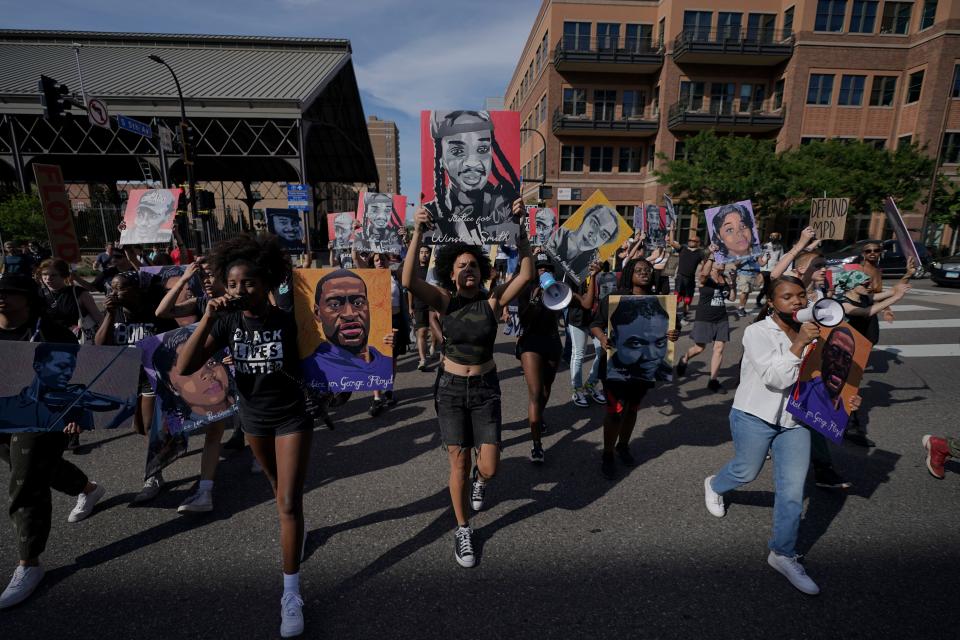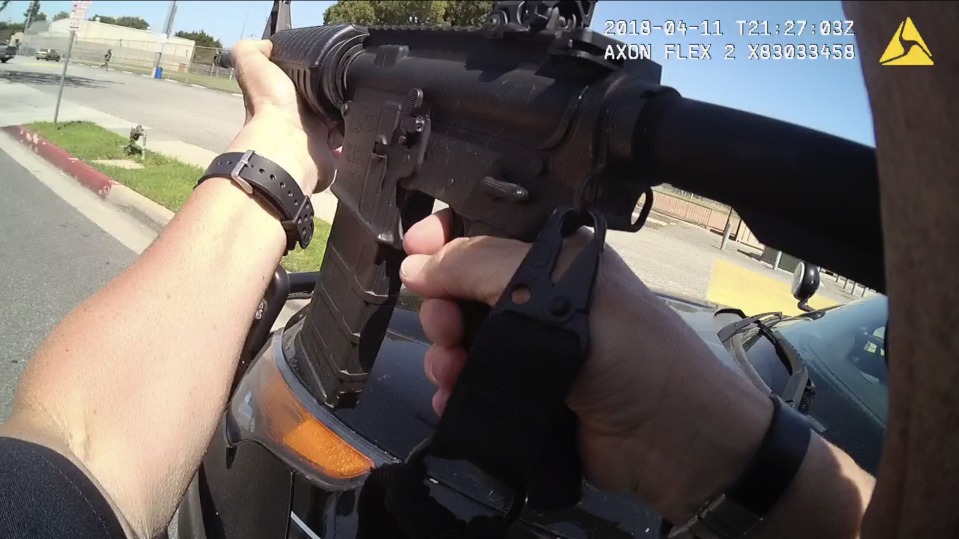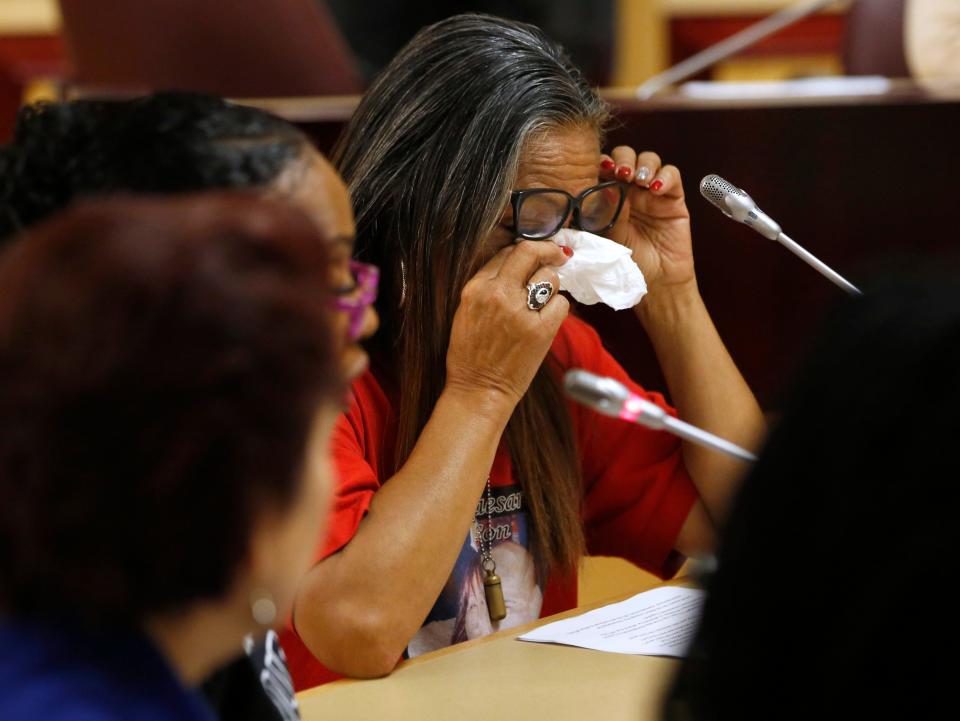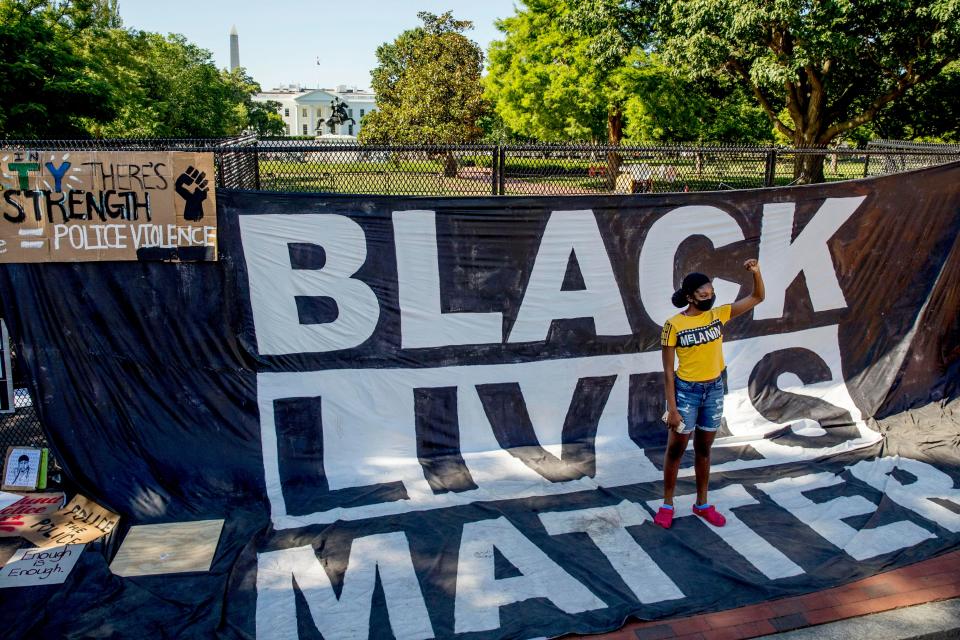New California police accountability law will strip bad cops of badges, won't end immunity from lawsuits
- Oops!Something went wrong.Please try again later.
A California law signed by Gov. Gavin Newsom on Thursday aims to address problem law enforcement officers who jump from department to department, but it fails to deal with an ambiguity in state law that makes it easier for police to claim immunity from liability when they hurt or kill people.
The law was crafted to hold the state's roughly 80,000 law enforcement officers accountable by decertifying those who engage in serious misconduct, effectively preventing them from policing in California.
This is the second attempt by lawmakers to pass policing reforms since George Floyd was killed by a Minneapolis police officer in May 2020. The bill would give California one of the strongest processes in the country for decertifying officers.
Newsom's staff worked closely with the bill's author, Democratic state Sen. Steven Bradford of Gardena, California.
"For far too long, we’ve seen these acts being done to citizens and officers never being held accountable," Bradford told USA TODAY. "This will bring accountability along with a greater deal of trust in law enforcement, which is extremely lacking in African American and brown communities."

Most states can decertify problem officers, much like a lawyer is disbarred or a doctor has his license revoked. Only California, Rhode Island, Hawaii and New Jersey lack this power. In those states, even if law enforcement officers are fired or forced to quit, they could work elsewhere.
Last week, efforts to pass federal legislation to reform the nation's 18,000 law enforcement agencies stalled in the Senate. Civil rights and police reform advocates say state legislatures are the best remaining venue to strengthen police accountability.
Since Floyd's death, lawmakers in more than half of the states have put forward bills that would eliminate immunity and make it easier for officers to be sued outside federal court for constitutional violations, said Nick Sibilla, a legislative analyst for the Institute for Justice, a public interest law firm.
Those efforts succeeded in Colorado, New Mexico and New York City, he said. In other states, most bills have been defeated or tabled after police unions loudly opposed them.
California's bill, known as Senate Bill 2, is a bellwether for further reforms, Sibilla said. He said it could give a "second wind to this new wave of police reform bills we've been seeing."
The bill goes into effect in January, though full implementation isn't likely until 2023.
“If you don’t like the way the world looks when you’re standing up, stand on your head, and go local,” Newsom said after the signing. “Remarkable things are still happening in cities and states all across this country. I want folks not to lose hope, that just because things aren’t happening in Washington, D.C. that we can’t move the needle here.”

Bill is named for man killed by Gardena police officer
Fouzia Almarou, 47, didn't learn what really happened to her 25-year-old son, Kenneth Ross Jr., until more than two years after he was killed. Ross, who was mentally ill, was killed by Gardena police Sgt. Michael Robbins in April 2018.
A police officer said he matched the description of a shooting suspect. She pulled her gun and pursued Ross with her vehicle as he ran into the parking lot of a neighborhood park.
Robbins arrived, aimed a rifle and fatally shot Ross in the back within seconds.
Ross appeared to be holding up his pants as he ran, bodycam video shows. Robbins, who was dozens of feet away, told investigators he thought Ross looked over at him and swung his arm from his left waistband as if he were drawing a gun.
Robbins told investigators he "gave him two quick rounds – a double tap that was just amazing. Training just kicked in, and, uh, he went down."

The Los Angeles County District Attorney's Office declined to press charges, saying officers thought Ross was armed and a gun was retrieved at the scene. Bodycam video doesn't show officers finding a gun when they handcuffed Ross' lifeless body, his pants fallen below his buttocks, and searched him.
"I’ve been protesting ever since," Almarou said. She met Bradford at a rally for her son in Gardena, in metropolitan Los Angeles, and worked with him to get SB 2 passed. The bill's formal name is the Kenneth Ross Jr. Police Decertification Act of 2021.
Almarou said she lives daily with the pain of losing her first-born son, whom she had at 18 years old. "We grew up together," Almarou said at Thursday's signing ceremony. "He was the love of my life."
Ross left behind his own son, who is 7 years old. Robbins retired shortly after the incident. The family's federal civil rights lawsuit against him and the city was settled this month, according to court filings. No details were disclosed.

Lawyers representing Robbins did not reply to requests for comment.
Robbins, who had been the "sniper team leader" at an Orange County law enforcement agency, had been involved in three prior shootings. In December 1998, he left the Gardena Police Department, where he had been involved in two shootings over roughly seven years, for the Orange Police Department. He was involved in one shooting with the Orange police SWAT team. In 2016, he transferred back to Gardena.
That's the sort of thing California's law is supposed to address, Bradford said.
“The whole purpose of this bill,” he said, “is to make sure this doesn't happen anymore –that ‘wash, rinse and repeat’” cycle in which officers change jobs without being held accountable.
He added, Thursday, that no one should fear being met by a problematic officer when they call 911, and that their emergency will be turned into a tragedy.
Thursday's signing ceremony took place at the Gardena park where Ross was killed.
How the California's new law works
The idea behind the law is to hold police officers, who are certified by the state of California, to certain minimum standards like other professions, said Peter Bibring, senior counsel for the American Civil Liberties Union of Southern California. For example, an employer might be fine with a lawyer's actions, but the state bar might say the actions are not OK.
"The whole problem with police discipline that has gotten us to this point is that police have done a poor job of policing themselves, and the public does not trust them to do this," Bibring said.
The law tasks the state Commission on Peace Officer Standards and Training with defining what type of misconduct are serious enough to justify removal or suspension of an officer's license.
A new division within the agency will review cases, including those based on complaints from the public, news coverage or departmental discipline. The law requires law enforcement agencies to notify the state of misconduct that results in termination or discipline and to share their investigative files.
Bibring said this is particularly important because problem officers tend to be drawn to departments that tolerate use of force.
There would be several steps to removing a police officer's certification.
If the state agency decides there are grounds for decertification, a nine-person advisory board, mostly made up of community-based organizations, would weigh in. It will take a two-thirds vote to recommend decertification.
Critics of the law referred to the advisory board as amateurish and politically motivated, in part because victims of police misconduct could hold up to two seats on the board.
Brian Marvel, president of the Peace Officers Research Association of California, said no professional licensing board would include someone linked to a victim.
The Commission on Peace Officer Standards and Training will decide whether to move forward with decertification. If it did, the case would be brought to a hearing before an administrative law judge. That decision could be appealed by the officer.
Florida, which has about 50,000 law enforcement officers, decertifies about 300 officers annually, Bibring said. California, which has 30,000 more officers, is likely to decertify more.
Bill doesn't address immunity interpretation
In most states, when the family of someone killed by police files a civil rights lawsuit, they must do it in federal court.
For decades, the U.S. Supreme Court has maintained a precedent called "qualified immunity," which protects law enforcement officers from liability if they violate someone's rights by hurting or killing them while on the job.
California has its own civil rights law known as the Tom Bane Civil Rights Act. It allows people to sue individuals who attempt or succeed in interfering with someone's civil rights by "threat, intimidation, or coercion."
Over the years, some courts have narrowly interpreted the Bane Act as requiring that a person who engages in those actions do so with the desire or knowledge that he or she would break the law, Sibilla said.

An earlier version of SB 2 said that higher standard wasn't necessary. That language was removed to secure enough votes for passage.
"You eat an elephant one bite at a time. We took a big chunk out, and next year we can address some of those outstanding issues," Bradford said.
SB 2 would remove several types of immunity for law enforcement. It would take away immunity given to corrections officers if prisoners are injured in their custody. The bill eliminates a provision that prevents law enforcement officers from being held liable for anything done during the course of an investigation, even if officers acted maliciously or without probable cause, Sibilla said.
He noted that some parts of the law date back to the 1960s, before major civil rights legislation was passed in the USA.
Sibilla said promises of immunity for law enforcement officers aren't necessary because state law requires public employers to protect employees from liability while on the job.
"The idea that this is necessary because some poor officer is going to lose their house" is not accurate, Sibilla said.
Bradford said that two Torrance officers were charged and fired last year because of vandalism and racist behavior, but because there was no decertification process, they were hired by another department.
"They are working now today," Bradford said. "Had SB 2 been in place, those guys would not have been hired."
California isn't in front on police accountability
California is typically a pioneer of liberal policies, but the state is less of a leader in ensuring cops are held accountable for civil rights violations.
A few states, including New Mexico and Colorado, do not allow police officers to claim immunity when sued in such cases.
Lawmakers in those states "are trying to address real weaknesses in the current federal law that are a product or a significant part of qualified immunity," said Joanna Schwartz, a professor at UCLA School of Law.

In Colorado, officers can be held personally liable for up to $25,000 or 5% of a judgment, whichever is less. Only if the officer can't pay does the bill go to his employer. The employer doesn't have to pay if the officer is convicted of a crime related to his misconduct.
The Bane Act made California an early mover in providing a way to sue for constitutional violations under state law, Schwartz said, but its "web of immunities and requirements put it behind a place like Colorado."
Newsom said Thursday that he's mindful that the state has been both a leader and a laggard on police reform.
"We have a lot to be proud of, but there's areas we have nothing to brag about," Newsom said. "Why is it so hard to do the right thing?"
Over the last year, New York City passed a law allowing people to sue for unreasonable search and seizure as well as excessive force. Officers "would not be allowed qualified immunity, or any substantial equivalent immunity as a defense," according to City Council records.
After its passage, an association for NYPD officers shared a legal analysis of the law that called the elimination of the qualified immunity defense "troubling."
In a memo to rank-and-file officers, lawyers wrote that they anticipated a flood of lawsuits against members of the NYPD.
As a result of the law's passage, their legal advice was "avoid physical engagement to the greatest extent possible" and not to search people or cars "unless you are certain that you are clearly and unequivocally within the bounds of the law."
Marvel, who heads California's largest law enforcement organization, said the group plans to work with the state agency and elected leaders to iron out the process and deal with officers' concerns.
"It's a new program," Marvel said. "It's not going to be perfect, but we're going to do the best we can to make it fair for the individual going through the process."
Though some have worried the bill would hurt recruitment, Bradford said it will help because there would be a process to end the careers of problem cops. "I think it's going to build greater trust," he said.
Tami Abdollah is a USA TODAY national correspondent covering inequities in the criminal justice system. Send tips via direct message @latams or email tami(at)usatoday.com
This article originally appeared on USA TODAY: California law will strip bad cops of badges, but immunity remains

